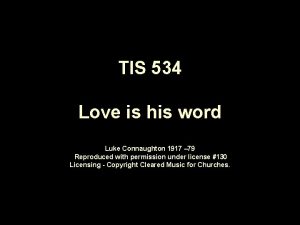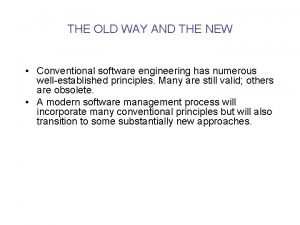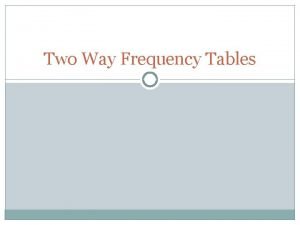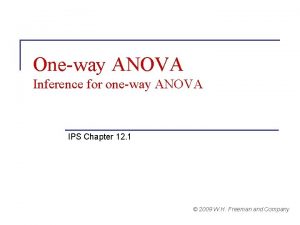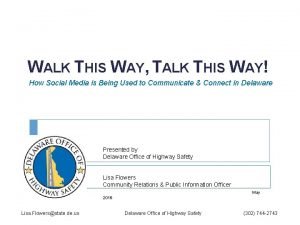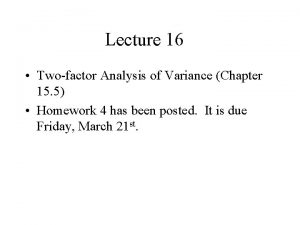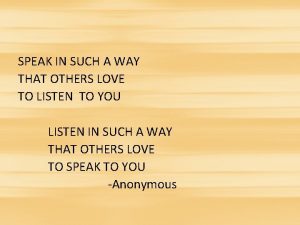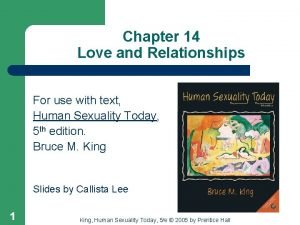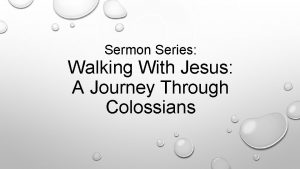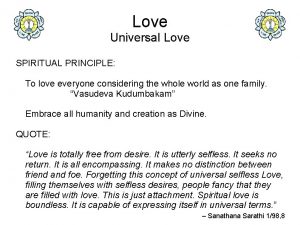Walking the Way of Love A journey through


























- Slides: 26

Walking the Way of Love: A journey through the Baptismal Covenant Session 5 Bless: Dignity and Justice for All

Introductory Questions Strive for justice and peace among all people and respect the dignity of every human being. ● How do you live out this promise? ● What does the step Bless mean? ● How does our church live out this promise to Bless as a community of faith?

Bible Study For the Lord your God is God of gods and Lord of lords, the great God, mighty and awesome, who is not partial and takes no bribe, who executes justice for the orphan and the widow, and who loves the strangers, providing them food and clothing. You shall also love the stranger, for you were strangers in the land of Egypt. Deut 10: 17 -19 He has told you, O mortal, what is good; and what does the Lord require of you but to do justice, and to love kindness, and to walk humbly with your God? Micah 6: 8

Bible Study Here is my servant, whom I uphold, my chosen, in whom my soul delights; I have put my spirit upon him; he will bring forth justice to the nations…. I have given you as a covenant to the people, [a] a light to the nations, to open the eyes that are blind, to bring out the prisoners from the dungeon, from the prison those who sit in darkness. Isaiah 42: 1 -7

Bible Study ● What is justice? How do we advocate for justice? ● Why is it important to strive for justice? ● Is it possible to strive for justice while also disrespecting dignity?

Respecting Dignity What is Paternalism?

Respecting Dignity “Social justice is more than a law that orders the distribution, it is an internal attitude with Christ that draws one another into brotherly and sisterly love. ” –Saint Romero

Respecting Dignity Paternalism: ● Treating people as less than autonomous adults ○ As if they can’t act for themselves ○ Deciding what is best for someone ○ Doing for someone what they can do themselves ● Historically common in mission ● Creates ineffective programs ● More information ○ When Helping Hurts ○ Toxic Charity

Respecting Dignity Paternalism: ● Spiritual disease ○ “My wealth and knowledge mean I am better” ○ “I can fix this person’s situation better than they can” ○ “This person needs me to act on their behalf” ● Disregards the person’s agency ● Disregards the work of the Holy Spirit

Human Rights Respecting Dignity

Respecting Dignity “If you have come here to help me, you are wasting your time. But if you have come because your liberation is bound up with mine, then let us work together. ” –Lila Watson Aboriginal Activists Group Australia 1970 s

Respecting Dignity Incarnational Relationship: ● Jesus’s Example: ○ Helps those who ask for help ○ Invites people’s participation ○ “Your faith has made you well. ”

Respecting Dignity Incarnational Relationship: ● Our responsibility is to be in relationship with people ○ ○ ○ ○ Witness Be in Solidarity Listen and Learn Worship Together Share Repent Act Together

Human Rights The Rights-based Approach


The Rights-based Approach Principles of the Human Rights Approach (PANEL): Participation (inclusion) Accountability (transparency) Non-discrimination Equality Link with Human Rights

The Rights-Based Approach Participation ● The beneficiaries should participate in the process ○ Work with, not for ● Participation should not be coerced ○ Forced or manipulated participation ○ Participants should feel free to voice their ideas

The Rights-Based Approach Accountability ● Duty-bearers must be held accountable ○ ○ Donors Nonprofits Governments Individuals ● Accountable for. . . ○ Lack of corruption ○ Effective results ● Accountability looks like repent and return

The Rights-Based Approach Non-discrimination ● No one should be excluded or discriminated against ● We must actively work against discrimination ○ “Preferential option for ______” ○ Formation programs

Characteristics of Human Rights Equality ● Equal participation ● Equal respect for people’s rights ○ Universal ○ Inalienable ○ Imprescriptible

Characteristics of Human Rights Link with Human Rights ● Address rights violations ● Respect characteristics of human rights ● Builds capacity of rights-holders and duty-bearers

Human Rights Spotlight Ministry: Sacred Resistance L. A.


Discussion Questions: Sacred Resistance ● ● ● How does this ministry incorporate human rights into their work? How does this ministry respond to discrimination? What is the new narrative that this ministry constructs? How does this ministry connect this baptismal promise with their work? How is this ministry a blessing to its leaders, participants, and those they serve?

Discussion Questions: Dignity and Justice for All Journal, take notes, collect your thoughts: ● Key ideas that influenced me ● Where do I see these ideas in my own life? ● How can I use the Rights-based approach?

Discussion Questions: Dignity and Justice for All ● How do we understand the connection between this baptismal promise, Scripture and human rights? ● How can we apply this in our lives? ● How can we transform our mission and ministry as a community of faith using these concepts?
 Walking the way of love
Walking the way of love Luke connaughton
Luke connaughton Love love jesus is love god greatest gift lyrics
Love love jesus is love god greatest gift lyrics The salvation of man is through love and in love
The salvation of man is through love and in love Walking in treacle
Walking in treacle What are the food groups in a cheese sandwich
What are the food groups in a cheese sandwich Food groups in a cheese sandwich
Food groups in a cheese sandwich What was the effect of cabeza de vaca journey through texas
What was the effect of cabeza de vaca journey through texas Explain threaded binary tree in data structure
Explain threaded binary tree in data structure Principles of conventional software engineering
Principles of conventional software engineering Uji two way anova
Uji two way anova Perbedaan one way dan two way anova
Perbedaan one way dan two way anova Bottle of rum to fill my tum
Bottle of rum to fill my tum Key club meaning
Key club meaning 2 way anova example
2 way anova example Talk this way
Talk this way Perbedaan one way dan two way anova
Perbedaan one way dan two way anova One way anova vs two way anova
One way anova vs two way anova Love is the most excellent way
Love is the most excellent way Twelfth night poem
Twelfth night poem Contoh persepsi lingkungan fisik
Contoh persepsi lingkungan fisik If love fails it was never love
If love fails it was never love Passionate love vs companionate love
Passionate love vs companionate love Passionate love vs companionate love
Passionate love vs companionate love Love begets love
Love begets love In love vs love
In love vs love Oh my love, my darling
Oh my love, my darling

